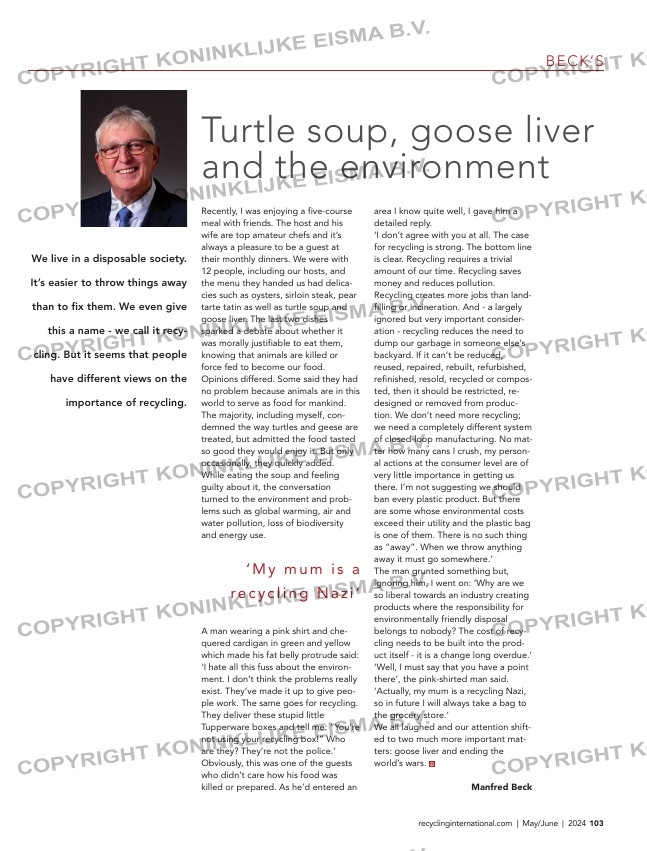Page 103 from: What’s inside?

BECK’S
recyclinginternational.com | May/June | 2024 103
Fotobijschrift
KADERKOP
??
Turtle soup, goose liver
and the environment
We live in a disposable society.
It’s easier to throw things away
than to fix them. We even give
this a name – we call it recy-
cling. But it seems that people
have different views on the
importance of recycling.
Recently, I was enjoying a five-course
meal with friends. The host and his
wife are top amateur chefs and it’s
always a pleasure to be a guest at
their monthly dinners. We were with
12 people, including our hosts, and
the menu they handed us had delica-
cies such as oysters, sirloin steak, pear
tarte tatin as well as turtle soup and
goose liver. The last two dishes
sparked a debate about whether it
was morally justifiable to eat them,
knowing that animals are killed or
force fed to become our food.
Opinions differed. Some said they had
no problem because animals are in this
world to serve as food for mankind.
The majority, including myself, con-
demned the way turtles and geese are
treated, but admitted the food tasted
so good they would enjoy it. But only
occasionally, they quickly added.
While eating the soup and feeling
guilty about it, the conversation
turned to the environment and prob-
lems such as global warming, air and
water pollution, loss of biodiversity
and energy use.
A man wearing a pink shirt and che-
quered cardigan in green and yellow
which made his fat belly protrude said:
‘I hate all this fuss about the environ-
ment. I don’t think the problems really
exist. They’ve made it up to give peo-
ple work. The same goes for recycling.
They deliver these stupid little
Tupperware boxes and tell me: “You’re
not using your recycling box!” Who
are they? They’re not the police.’
Obviously, this was one of the guests
who didn’t care how his food was
killed or prepared. As he’d entered an
area I know quite well, I gave him a
detailed reply.
‘I don’t agree with you at all. The case
for recycling is strong. The bottom line
is clear. Recycling requires a trivial
amount of our time. Recycling saves
money and reduces pollution.
Recycling creates more jobs than land-
filling or incineration. And – a largely
ignored but very important consider-
ation – recycling reduces the need to
dump our garbage in someone else’s
backyard. If it can’t be reduced,
reused, repaired, rebuilt, refurbished,
refinished, resold, recycled or compos-
ted, then it should be restricted, re-
designed or removed from produc-
tion. We don’t need more recycling;
we need a completely different system
of closed-loop manufacturing. No mat-
ter how many cans I crush, my person-
al actions at the consumer level are of
very little importance in getting us
there. I’m not suggesting we should
ban every plastic product. But there
are some whose environmental costs
exceed their utility and the plastic bag
is one of them. There is no such thing
as “away”. When we throw anything
away it must go somewhere.’
The man grunted something but,
ignoring him, I went on: ‘Why are we
so liberal towards an industry creating
products where the responsibility for
environmentally friendly disposal
belongs to nobody? The cost of recy-
cling needs to be built into the prod-
uct itself – it is a change long overdue.’
‘Well, I must say that you have a point
there’, the pink-shirted man said.
‘Actually, my mum is a recycling Nazi,
so in future I will always take a bag to
the grocery store.’
We all laughed and our attention shift-
ed to two much more important mat-
ters: goose liver and ending the
world’s wars.
Manfred Beck
‘ M y m u m i s a
re c y c l i n g N a z i ’
103_becks.indd 103 25-04-2024 11:03



